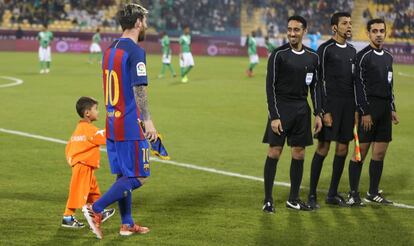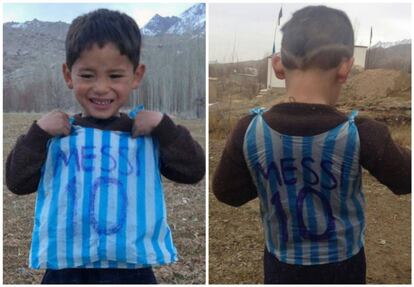How the dreams of Messi’s young Afghan fan turned into a nightmare
The family of seven-year-old Murtaza Ahmadi, who met his soccer idol in 2016, is currently living in fear of the Taliban

It was the happiest day of Murtaza Ahmadi’s life. Dressed in a tracksuit several sizes too big for him, the five-year-old child entered the Doha soccer stadium hand in hand with his Argentine hero, Lionel Messi.
That was in December 2016. But neither the encounter, nor the football and shirts that Messi signed for him, would protect Murtaza from the brutal reality of the ongoing conflict in his country. For the next two years, reiterated threats on his life have meant he cannot venture out of the house.
The family fears that criminals, believing Messi gave them money, will kidnap the child
It all began with a photo of Murtaza kicking a ball on a dirt track near his home in Ghazni province, southwest of Kabul. The boy had “Messi” and “10” penned over Argentina’s colors, but the shirt itself was nothing more than a plastic bag fashioned by Murtaza’s older brother Humayun. The image was subsequently chosen by France Presse as Photo of the Year and went viral on social media, bringing it to Messi’s attention. Through UNICEF, the Barcelona star sent Murtaza a Barça shirt and an Argentine national jersey, and more photos were taken.
Then the organizers of the Qatar 2022 World Cup invited Murtaza to meet Messi in person at a friendly match between Barcelona and Al Ahli of Saudi Arabia. It was a touching encounter that made global headlines. At the time, EL PAÍS quoted the child as saying: “I feel very happy to have met my hero. It was my dream.” But the dream was short lived.
Buoyed by promises of help, Murtuza and his family had subsequently hoped to obtain political asylum in the US. They made it as far as Pakistan, but their request was rejected and they returned to their village.

For many years, Ghazni province was one of the most peaceful corners of war-torn Afghanistan, but this year the Taliban launched an assault on the region that forced the Ahmadis to flee. Like most of the population in Ghazni, the family is Hazara, an ethnic Shiite minority that has long been targeted by both the Taliban and Islamic State – both Sunni.
Earlier this month, a France Presse reporter tracked down Murtaza and his family. Murtaza’s father Arif had taken them under the cover of darkness to the relative safety of government-controlled Kabul, then returned alone to the village, where he continues to work as a day laborer to support them.
The encounter with Messi may have been a dream, but the fame it brought Murtaza and his family has been a nightmare. For two years, the Ahmadis have lived in fear that the Taliban will try to abduct Murtaza – during the Taliban regime from 1996 to 2001, sport was not tolerated and the extremists used the Kabul stadium for public executions and stonings.
Murtaza realized one of his biggest dreams today! He received team jerseys and an autographed football with a personal...
Posted by UNICEF Afghanistan on Wednesday, February 24, 2016
They also fear that criminals, believing Messi gave them money, will kidnap the child and hold him for ransom. “There have been threats saying if they get him, they will cut him into pieces,” says a horrified Shafiqa, Murtaza’s mother. Others simply tell them: “You’ve become rich; hand over what Messi has given you or we will take your son.”
Strangers have been spotted loitering close to their home, and the family is afraid of letting Murtaza play out on the street or even go to school.
During their flight to Kabul, Shafiqa covered Murtaza’s face with a veil so no one would recognize him. “We are scared that something bad will happen if someone recognizes him,” says Murtaza’s brother Humayun.
Murtaza, who is now seven, misses the ball and shirts that Messi gave him. “I want them back so I can play,” he says.
“We didn’t have time to take anything,” Shafiqa explains. “We had to run for our lives with nothing but the clothes on our backs.”
English version by Heather Galloway.
Tu suscripción se está usando en otro dispositivo
¿Quieres añadir otro usuario a tu suscripción?
Si continúas leyendo en este dispositivo, no se podrá leer en el otro.
FlechaTu suscripción se está usando en otro dispositivo y solo puedes acceder a EL PAÍS desde un dispositivo a la vez.
Si quieres compartir tu cuenta, cambia tu suscripción a la modalidad Premium, así podrás añadir otro usuario. Cada uno accederá con su propia cuenta de email, lo que os permitirá personalizar vuestra experiencia en EL PAÍS.
¿Tienes una suscripción de empresa? Accede aquí para contratar más cuentas.
En el caso de no saber quién está usando tu cuenta, te recomendamos cambiar tu contraseña aquí.
Si decides continuar compartiendo tu cuenta, este mensaje se mostrará en tu dispositivo y en el de la otra persona que está usando tu cuenta de forma indefinida, afectando a tu experiencia de lectura. Puedes consultar aquí los términos y condiciones de la suscripción digital.









































